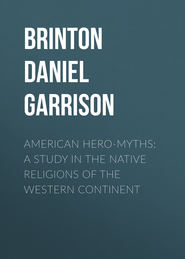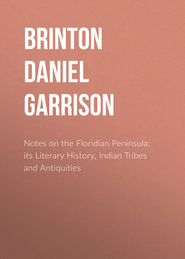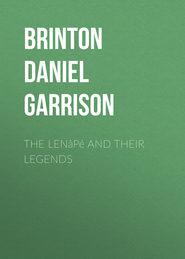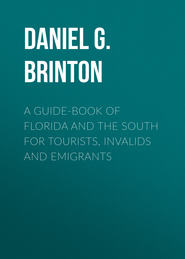По всем вопросам обращайтесь на: info@litportal.ru
(©) 2003-2024.
✖
The Religious Sentiment
Настройки чтения
Размер шрифта
Высота строк
Поля
“What are things eternal? – Powers depart,
Possessions vanish, and opinions change,
And passions hold a fluctuating seat;
But, by the storms of circumstance unshaken,
And subject neither to eclipse nor wane,
Duty exists; immutably survive
For our support, the measures and the forms
Which an abstract intelligence supplies;
Whose kingdom is where time and space are not.”
There is no danger that we shall not know what is thus true when we see it. The sane reason cannot reject it. “The true,” says Novalis, “is that which we cannot help believing.” It is the perceptio per solam essentiam of Spinoza. It asks not faith nor yet testimony; it stands in need of neither.
Mathematical truth is of this nature. We cannot, if we try, believe that twice two is five. Hence the unceasing effort of all science is to give its results mathematical expression. Such truth so informs itself with will that once received, it is never thereafter alienated; obedience to it does not impair freedom. Necessity and servitude do not arise from correct reasoning, but through the limitation of fallacies. They have nothing to do with
“Those transcendent truths
Of the pure intellect, that stand as laws
Even to Thy Being’s infinite majesty.”
It is not derogatory, but on the contrary essential to the conception of the Supreme Reason, the Divine Logos, to contemplate its will as in accord and one with the forms of abstract truth. “The ‘will of God’” says Spinoza, “is the refuge of ignorance; the true Will is the spirit of right reasoning.”
This identification of the forms of thought with the Absolute is almost as old as philosophy itself. The objections to it have been that no independent existence attaches to these forms; that they prescribe the conditions of thought but are not thought itself, still less being; that they hold good to thought as known to man’s reason, but perchance not to thought in other intelligences; and, therefore, that even if through the dialectical development of thought a consistent idea of the universe were framed, that is, one wherein every fact was referred to its appropriate law, still would remain the inquiry, Is this the last and absolute truth?
The principal points in these objections are that abstract thought does not postulate being; and that possibly all intelligence is not one in kind. To the former objection the most satisfactory, reply has been offered by Professor J. F. Ferrier. He has shown that the conception of object, even ideal object, implies the conception of self in the subject; and upon this proposition which has been fully recognized even by those who differ from him widely, he grounds the existence of Supreme Thought as a logical unity. Those who would pursue this branch of the subject further, I would refer to his singularly able work.[19 - The Institutes of Metaphysic, 2d Ed. See also Bain, The Emotions and the Will, the closing note.]
The latter consideration will come up in a later chapter. If it be shown that all possible intelligence proceeds on the same laws as that of man, and that the essence of this is activity, permanence, or truth – synonymous terms – then the limitation of time ceases, and existence not in time but without regard to time, is a necessary consequence. Knowledge through intellection can alone reach a truth independent of time; that through sensation is always relative, true for the time only. The former cannot be expressed without the implication of the conceptions of the universal and the eternal as “dominant among the subjects of thought with which Logic is concerned;”[20 - Boole, Laws of Thought, p. 401.] and hence the relation which the intellect bears to the absolute is a real and positive one.
THE EMOTIONAL ELEMENTS OF THE RELIGIOUS SENTIMENT
SUMMARY
The Religious Sentiment is made up of emotions and thoughts. The emotions are historically first and most prominent. Of all concerned, Fear is the most obvious. Hope is its correlate. Both suppose Experience, and a desire to repeat or avoid it. Hence a Wish is the source of both emotions, and the proximate element of religion. The significance of desire as the postulate of development. The influence of fear and hope. The conditions which encourage them.
The success of desire fails to gratify the religious sentiment. The alternative left is eternal repose, or else action, unending yet which aims at nothing beyond. The latter is reached through Love. The result of love is continuance. Illustrations of this. Sexual love and the venereal sense in religions. The hermaphrodite gods. The virgin mother. Mohammed was the first to proclaim a deity above sex. The conversion of sexual and religious emotion exemplified from insane delusions. The element of fascination. The love of God. Other emotional elements in religions.
The religious wish defined to be one whose fruition depends upon unknown power. To be religious, one must desire and be ignorant. The unknown power is of religious interest only in so far as it is believed to be in relation to men’s desires. In what sense ignorance is the mother of devotion.
CHAPTER II
THE EMOTIONAL ELEMENTS OF THE RELIGIOUS SENTIMENT
The discussion in the last chapter illustrated how closely pain and pleasure, truth and error, and thought and its laws have been related to the forms of religions, and their dogmatic expressions. The character of the relatively and absolutely true was touched upon, and the latter, it was indicated, if attainable at all by human intelligence, must be found in the formal laws of that intelligence, those which constitute its nature and essence, and in the conclusions which such a premise forces upon the reason. The necessity of this preliminary inquiry arose from the fact that every historical religion claims the monopoly of the absolutely true, and such claims can be tested only when we have decided as to whether there is such truth, and if there is, where it is to be sought. Moreover, as religions arise from some mental demand, the different manifestations of mind, – sensation, emotion and intellect – must be recognized and understood.
Passing now to a particular description of the Religious Sentiment, it may roughly be defined to be the feeling which prompts to thoughts or acts of worship. It is, as I have said, a complex product, made up of emotions and ideas, developing with the growth of mind, wide-reaching in its maturity, but meagre enough at the start. We need not expect to find in its simplest phases that insight and tender feeling which we attribute to the developed religious character. “The scent of the blossom is not in the bulb.” Its early and ruder forms, however, will best teach the mental elements which are at its root.
The problem is, to find out why the primitive man figured to himself any gods at all; what necessity of his nature or his condition led him so universally to assume their existence, and seek their aid or their mercy? The conditions of the solution are, that it hold good everywhere and at all times; that it enable us to trace in every creed and cult the same sentiments which first impelled man to seek a god and adore him. Why is it that now and in remotest history, here and in the uttermost regions, there is and always has been this that we call religion? There must be some common reason, some universal peculiarity in man’s mental formation which prompts, which forces him, him alone of animals, and him without exception, to this discourse and observance of religion. What this is, it is my present purpose to try to find out.
In speaking of the development of mind through organism, it was seen that the emotions precede the reason in point of time. This is daily confirmed by observation. The child is vastly more emotional than the man, the savage than his civilized neighbor. Castren, the Russian traveller, describes the Tartars and Lapps as a most nervous folk. When one shocks them with a sudden noise, they almost fall into convulsions. Among the North American Indians, falsely called a phlegmatic race, nervous diseases are epidemic to an almost unparalleled extent. Intense thought, on the other hand, as I have before said, tends to lessen and annul the emotions. Intellectual self-consciousness is adverse to them.
But religion, we are everywhere told, is largely a matter of the emotions. The pulpit constantly resounds with appeals to the feelings, and not unfrequently with warnings against the intellect. “I acknowledge myself,” says the pious non-juror, William Law, “a declared enemy to the use of reason in religion;” and he often repeats his condemnation of “the labor-learned professors of far-fetched book-riches.”[21 - Address to the Clergy, pp. 42, 43, 67, 106, etc.] As the eye is the organ of sight, says one whose thoughts on such matters equal in depth those of Pascal, so the heart is the organ of religion.[22 - E. von Hardenberg [Novalis], Werke, s. 364.] In popular physiology, the heart is the seat of the emotions as the brain is that of intellect. It is appropriate, therefore, that we commence our analysis of the religious sentiment with the emotions which form such a prominent part of it.
Now, whether we take the experience of an individual or the history of a tribe, whether we have recourse to the opinions of religious teachers or irreligious philosophers, we find them nigh unanimous that the emotion which is the prime motor of religious thought is fear. I need not depend upon the well-known line of Petronius Arbiter
Primus in orbe deos fecit timor;
, for there is plenty of less heterodox authority. The worthy Bishop Hall says, “Seldom doth God seize upon the heart without a vehement concussion going before. There must be some blustering and flashes of the law. We cannot be too awful in our fear.”[23 - Treatises Devotional and Practical, p. 188. London, 1836.] Bunyan, in his beautiful allegory of the religious life, lets Christian exclaim: “Had even Obstinate himself felt what I have felt of the terrors of the yet unseen, he would not thus lightly have given us the back.” The very word for God in the Semitic tongues means “fear;”[24 - In Aramaic dachla means either a god or fear. The Arabic Allah and the Hebrew Eloah are by some traced to a common root, signifying to tremble, to show fear, though the more usual derivation is from one meaning to be strong.] Jacob swore to Laban, “by Him whom Isaac feared;” and Moses warned his people that “God is come, that his fear may be before your faces.” To venerate is from a Sanscrit root (sêv), to be afraid of.
But it is needless to amass more evidence on this point. Few will question that fear is the most prominent emotion at the awakening of the religious sentiments. Let us rather proceed to inquire more minutely what fear is.
I remarked in the previous chapter that “the emotions fall naturally into a dual classification, in which the one involves pleasurable or elevating, the other painful or depressing conditions.” Fear comes of course under the latter category, as it is essentially a painful and depressing state of mind. But it corresponds with and implies the presence of Hope, for he who has nothing to hope has nothing to fear.[25 - “Wen die Hoffnung, den hat auch die Furcht verlassen.” Arthur Schopenhauer, Parerga und Paralipomena. Bd. ii. s. 474.] “There is no hope without fear, as there is no fear without hope,” says Spinoza. “For he who is in fear has some doubt whether what he fears will take place, and consequently hopes that it will not.”
We can go a step further, and say that in the mental process the hope must necessarily precede the fear. In the immediate moment of losing a pleasurable sensation we hope and seek for its repetition. The mind, untutored by experience, confidently looks for its return. The hope only becomes dashed by fear when experience has been associated with disappointment. Hence we must first look to enjoy a good before we can be troubled by a fear that we shall not enjoy it; we must first lay a plan before we can fear its failure. In modern Christianity hope, hope of immortal happiness, is more conspicuous than fear; but that hope is also based on the picture of a pleasant life made up from experience.
Both hope and fear, therefore, have been correctly called secondary or derived emotions, as they presuppose experience and belief, experience of a pleasure akin to that which we hope, belief that we can attain such a pleasure. “We do not hope first and enjoy afterwards, but we enjoy first and hope afterwards.”[26 - Alexander Bain, On the Study of Character, p. 128. See also his remarks in his work, The Emotions and the Will, p. 84, and in his notes to James Mill’s Analysis of the Mind, vol. i., pp. 124-125.] Having enjoyed, we seek to do so again. A desire, in other words, must precede either Hope or Fear. They are twin sisters, born of a Wish.
Thus my analysis traces the real source of the religious sentiment, so far as the emotions are concerned, to a Wish; and having arrived there, I find myself anticipated by the words of one of the most reflective minds of this century: “All religion rests on a mental want; we hope, we fear, because we wish.”[27 - Wilhelm von Humboldt’s Gesammelte Werke, Bd. vii., s. 62.] And long before this conclusion was reached by philosophers, it had been expressed in unconscious religious thought in myths, in the Valkyria, the Wish-maidens, for instance, who carried the decrees of Odin to earth.
This is no mean origin, for a wish, a desire, conscious or unconscious, in sensation only or in emotion as well, is the fundamental postulate of every sort of development, of improvement, of any possible future, of life of any kind, mental or physical. In its broadest meaning, science and history endorse the exclamation of the unhappy Obermann: “La perte vraiment irréparable est celle des désirs.”[28 - De Senancourt, Obermann, Lettre xli.]
The sense of unrest, the ceaseless longing for something else, which is the general source of all desires and wishes, is also the source of all endeavor and of all progress. Physiologically, it is the effort of our organization to adapt itself to the ever varying conditions which surround it; intellectually, it is the struggle to arrive at truth; in both, it is the effort to attain a fuller life.
As stimuli to action, therefore, the commonest and strongest of all emotions are Fear and Hope. They are the emotional correlates of pleasure and pain, which rule the life of sensation. Their closer consideration may well detain us awhile.
In the early stages of religious life, whether in an individual or a nation, the latter is half concealed. Fear is more demonstrative, and as it is essentially destructive, its effects are more sudden and visible. In its acuter forms, as Fright and Terror, it may blanch the hair in a night, blight the mind and destroy the life of the individual. As Panic, it is eminently epidemic, carrying crowds and armies before it; while in the aggravated form of Despair it swallows up all other emotions and prompts to self destruction. Its physiological effect is a direct impairment of vitality.
Hope is less intense and more lasting than fear. It stimulates the system, elates with the confidence of control, strengthens with the courage derived from a conviction of success, and bestows in advance the imagined joy of possession. As Feuchtersleben happily expresses it: “Hope preserves the principle of duration when other parts are threatened with destruction, and is a manifestation of the innermost psychical energy of Life.”[29 - Elements of Medical Psychology, p. 331.]
Both emotions powerfully prompt to action, and to that extent are opposed to thought. Based on belief, they banish uncertainty, and antagonize doubt and with it investigation. The religion in which they enter as the principal factors will be one intolerant of opposition, energetic in deed, and generally hostile to an unbiased pursuit of the truth.
Naturally those temperaments and those physical conditions which chiefly foster these emotions will tend to religious systems in which they are prominent. Let us see what some of these conditions are.
It has always been noticed that impaired vitality predisposes to fear. The sick and feeble are more timorous than the strong and well. Further predisposing causes of the same nature are insufficient nourishment, cold, gloom, malaria, advancing age and mental worry. For this reason nearly invariably after a general financial collapse we witness a religious “revival.” Age, full of care and fear, is thus prompted to piety, willing, as La Rochefoucauld remarks, to do good by precept when it can no longer do evil by example. The inhabitants of swampy, fever-ridden districts are usually devout. The female sex, always the weaker and often the worsted one in the struggle for existence, is when free more religious than the male; but with them hope is more commonly the incentive than fear.
Although thus prominent and powerful, desire, so far as its fruition is pleasure, has expressed but the lowest emotions of the religious sentiment. Something more than this has always been asked by sensitively religious minds. Success fails to bring the gratification it promises. The wish granted, the mind turns from it in satiety. Not this, after all, was what we sought.
The acutest thinkers have felt this. Pascal in his Pensées has such expressions as these: “The present is never our aim. The future alone is our object.” “Forever getting ready to be happy, it is certain we never can be.” “’Tis the combat pleases us and not the victory. As soon as that is achieved, we have had enough of the spectacle. So it is in play, so it is in the search for truth. We never pursue objects, but we pursue the pursuit of objects.” But no one has stated it more boldly than Lessing when he wrote: “If God held in his right hand all truth, and in his left the one unceasingly active desire for truth, although bound up with the law that I should forever err, I should choose with humility the left and say: ‘Give me this, Father. The pure truth is for thee alone.’”[30 - Lessing’s Gesammelte Werke. B. ii. s. 443 (Leipzig, 1855).] The pleasure seems to lie not in the booty but in the battle, not in gaining the stakes but in playing the game, not in the winning but in the wooing, not in the discovery of truth but in the search for it.
What is left for the wise, but to turn, as does the preacher, from this delusion of living, where laughter is mad and pleasure is vain, and praise the dead which are dead more than the living which are yet alive, or to esteem as better than both he that hath never been?
Such is the conclusion of many faiths. Wasted with combat, the mortal longs for the rest prepared for the weary. Buddha taught the extinguishment in Nirvana; the Brahman portrays the highest bliss as shanti, complete and eternal repose; and that the same longing was familiar to ancient Judaism, and has always been common to Christianity, numerous evidences testify.[31 - See Exodus, xxiii. 12; Psalms, lv. 6; Isaiah, xxx. 15; Jeremiah, vi. 16; Hebrews, v. 9. So St. Augustine: “et nos post opera nostra sabbato vitæ eternæ requiescamus in te.” Confessionum Lib. xiii. cap. 36.] Few epitaphs are more common than those which speak of the mortal resting in pace, in quiete.
The supposition at the root of these longings is that action must bring fatigue and pain, and though it bring pleasure too, it is bought too dearly. True in fact, I have shown that this conflicts with the theory of perfect life, even organic life. The highest form of life is the most unceasing living; its functions ask for their completest well being constant action, not satisfaction. That general feeling of health and strength, that sens de bien être, which goes with the most perfect physical life, is experienced only when all the organs are in complete working order and doing full duty. They impart to the whole frame a desire of motion. Hence the activity of the young and healthy as contrasted with the inertness of the exhausted and aged.
How is it possible to reconcile this ideal of life, still more the hope of everlasting life, with the acknowledged vanity of desire? It is accomplished through the medium of an emotion which more than any I have touched upon reveals the character of the religious sentiment – Love. This mighty but protean feeling I shall attempt to define on broader principles than has hitherto been done. The vague and partial meanings assigned it have led to sad confusion in the studies of religions. In the language of feeling, love is a passion; but it does not spring from feeling alone. It is far more fervid when it rises through intellect than through sense. “Men have died from time to time, and worms have eaten them, but not for love,” says the fair Rosalind; and though her saying is not very true as to the love of sense, it is far less true as to the love of intellect. The martyrs to science and religion, to principles and faith, multiply a hundred-fold those to the garden god. The spell of the idea is what
“Turns ruin into laughter and death into dreaming.”
Such love destroys the baser passion of sense, or transfigures it so that we know it no longer. The idea-driven is callous to the blandishments of beauty, for his is a love stronger than the love to woman. The vestal, the virgin, the eunuch for the kingdom of heaven’s sake are the exemplars of the love to God.
What common trait so marks these warring products of mind, that we call them by one name? In what is all love the same? The question is pertinent, for the love of woman, the love of neighbor, the love of country, the love of God, have made the positive side of most religions, the burden of their teachings. The priests of Cotytto and Venus, Astarte and Melitta, spoke but a more sensuous version of the sermon of the aged apostle to the Ephesians, – shortest and best of all sermons – “Little children, love one another.”[32 - “Filioli, diligite alterutrum.” This is the “testamentum Johannis,” as recorded from tradition by St. Jerome in his notes to the Epistle to the Galatians.]











